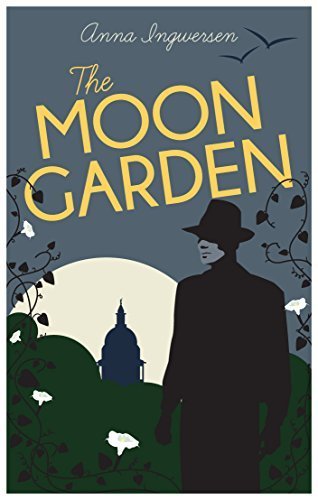An Interview with Anna Ingwersen, author of THE MOON GARDEN
Anna Ingwersen is a native Texan who spent her crucial years in New Mexico (still miss those sunsets) and has now settled in Edinburgh where she writes, reads, mothers, and teaches yoga. Currently, she’s working on another historical fiction novel and a short story. Her last short story,” The Snowbird,” was published in Deep South magazine. Anna’s been writing stories for as long as she can remember, including a sequel to Gone with the Wind, co-authored by Caroline Starr Rose, at the age of ten.

Please tell us about your book.
The Moon Garden is historical fiction taking place against the backdrop of pre and post Civil Rights Texas. Both main characters live under different societal constraints, James, as a black man passing for white, and Elana, as a free spirited abstract artist. Their attraction is strengthened by their shared identities as outsiders. However, their love affair cannot protect them from circumstances beyond their control, forcing decisions that, thirty years later, may finally be redeemed.
It’s a love story, but also a story about identity, ethics, and how the daily decisions we make shape the course of our entire lives. I also explore how we are limited by the times we are living in and how we struggle to create authentic lives under these constraints.
I’d never heard of Texas’s Veterans’ Land Act Scandal before reading your book. What drew you to this subject?
The Texas Veterans Land Board Scandal provided additional historical backdrop for the story. It was the biggest scandal in state history, one in which state land promoters and politicians were involved in cheating veterans, many of whom were black, out of low interest state backed loans for land. I was drawn to this scandal because at the time I was working in state government and could see how easily people can forget their ethics and forget they work as civil servants. After reading about the scandal, it just seemed ripe for a juicy novel! It was unbelievable how high and deep it ran, how a prominent lawyer investigating the scandal was the victim of an attempted murder via a car bombing, and how the story broke because an intrepid reporter from a small town followed his instincts and went on to win a Pulitzer for his work.
The glimpses you give us of both Austin and Galveston feel intimate and familiar. Can you talk a little about the importance of setting and specifically why you’re drawn to write about Texas?
I’m a Texan and spent most of my life in Austin and near Galveston. I love these two places for different reasons, and both places are very dear to my heart. Both places are very evocative for me. I suppose I’m always a bit homesick, and writing about these places helps me to be there on those days I miss hearing a mourning dove cooing outside my door or a cheeky grackle giving me a disapproving look.
Also, as a writer, I feel setting is an essential character in a book. I want a reader to feel they are fully immersed in the story and setting allows that to happen. As a reader I also love books with a well-drawn setting. It takes me somewhere new, a little holiday without leaving home.
Moon Garden moves between the 1950s past and the 1980s present. What made this the best way to tell your story?
I liked the idea of a man who had lived an extraordinary life during difficult times, looking back on his life and trying to make sense of it all. America’s history is so short and I felt contrasting the 1980s and the 1950s illustrated that really well. Only thirty years span between Jim Crow and the 1980s. So much had changed, yet for many, what they had experienced in terms of social change, wasn’t ancient history, and still isn’t!
What are some challenges associated with telling a story from two different character’s perspectives? What are some advantages?
I felt like I really knew James and Elana, so for me, I had to write from both perpectives. Both suffer from different, yet powerful societal constraints, and I was passionate about exploring that. I think if your characters both have a story to tell, then do it, just make sure they both need to be there. For a while, I didn’t want to listen to Elana and then she came out and demanded to be heard. It evolved that way naturally and through valuable feedback, I was able to let her come through.
I think the advantages of writing from two perpectives are that you get to see two different takes on the same events, that you see reality can be extremely different for two people living in the same time. I’ve always been fascinated by the diversity of experiences we all have and how it shapes our actions and who we are.
The post An Interview with Anna Ingwersen, author of THE MOON GARDEN appeared first on Caroline Starr Rose.



